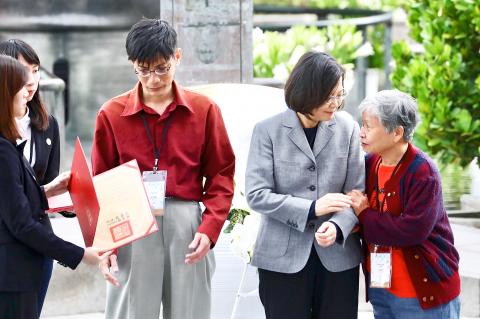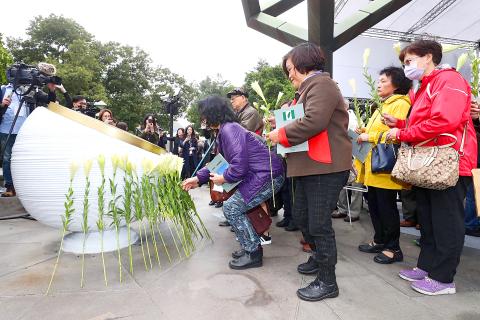The government’s ongoing push for transitional justice is intended to ensure that Taiwanese can live in a censor-free society without fear of being punished by an authoritarian government, President Tsai Ing-wen (蔡英文) said yesterday at a memorial ceremony to mark the 72nd anniversary of the 228 Incident.
Tsai said that as she arrived at the ceremony at Taipei’s 228 Peace Memorial Park she saw many young children and their parents enjoying a day off due to the national holiday.
The government is pushing to implement transitional justice to ensure that all Taiwanese live in a censor-free society “where people can read whatever they like and express their views without fear of being taken away by police in the middle of the night,” she said, referring to what happened to many during a brutal crackdown on an anti-government uprising in 1947 and the decades-long White Terror era that followed.

Photo: CNA
The 228 Incident was triggered by a clash between government officials and an illegal cigarette vendor in Taipei on Feb. 27, 1947, leading to protests a day later that were violently suppressed.
The crackdown triggered a broader anti-government uprising that was put down by the then-Chinese Nationalist Party (KMT) military forces.
An estimated 18,000 to 28,000 people were killed during the crackdown, which lasted into early May that year, a 1992 investigation commissioned by the Executive Yuan found.

Photo: CNA
Since Taiwan became a democracy, successive governments have made efforts to implement transitional justice, including admitting wrongdoing, issuing apologies to victims of the Incident, launching investigations and paying compensation, Tsai said.
This is an ongoing process as the government works to identify more potential victims of the Incident who were previously unrecorded, she said, adding that it would issue a new report later this year on the crackdown.
The 228 Memorial Foundation has already compiled a list of 400 people who might have been victims of the Incident, but whose families have yet to file for compensation, she said.
“This shows that we still have an insufficient understanding of the truth of that history,” Tsai said.
The president said that she does not subscribe to the view that such efforts are made as a means for the Democratic Progressive Party to score political points.
“Every democratic nation has to face the wounds of authoritarian rule. Psychological and emotional trauma will not heal itself,” Tsai said.
These measures are intended to serve as a reminder that the same mistakes would not be made again, she told the ceremony, which was attended by Incident victims and their families.
People lined up to pay tribute to the victims, laying lilies on a monument in the park.
Among the participants at the event was a four-person parliamentary delegation from Germany headed by Germany-Taiwan Parliamentary Friendship Group chairman Klaus-Peter Willsch.
Attending the event was a show of respect to the victims of the Incident, which ultimately paved the way for freedom, democracy and rule of law in Taiwan, Willsch told reporters.
Promoting transitional justice has always been important for his country and Germany can work closely with Taiwan, he said.
Willsch said that he was accompanied on his previous visit in May last year by German Federal Commissioner for the Records of the State Security Service of the Former German Democratic Republic Roland Jahn to share his country’s experience in this area with local authorities.
The agency preserves and protects archives, and investigates the past actions of the former State Security Service, commonly known as the Stasi, which served as a secret police and foreign intelligence organization in communist-ruled East Germany.

NATIONAL SECURITY THREAT: An official said that Guan Guan’s comments had gone beyond the threshold of free speech, as she advocated for the destruction of the ROC China-born media influencer Guan Guan’s (關關) residency permit has been revoked for repeatedly posting pro-China content that threatens national security, the National Immigration Agency said yesterday. Guan Guan has said many controversial things in her videos posted to Douyin (抖音), including “the red flag will soon be painted all over Taiwan” and “Taiwan is an inseparable part of China,” while expressing hope for expedited “reunification.” The agency received multiple reports alleging that Guan Guan had advocated for armed reunification last year. After investigating, the agency last month issued a notice requiring her to appear and account for her actions. Guan Guan appeared as required,

Japan and the Philippines yesterday signed a defense pact that would allow the tax-free provision of ammunition, fuel, food and other necessities when their forces stage joint training to boost deterrence against China’s growing aggression in the region and to bolster their preparation for natural disasters. Japan has faced increasing political, trade and security tensions with China, which was angered by Japanese Prime Minister Sanae Takaichi’s remark that a Chinese attack on Taiwan would be a survival-threatening situation for Japan, triggering a military response. Japan and the Philippines have also had separate territorial conflicts with Beijing in the East and South China

A strong cold air mass is expected to arrive tonight, bringing a change in weather and a drop in temperature, the Central Weather Administration (CWA) said. The coldest time would be early on Thursday morning, with temperatures in some areas dipping as low as 8°C, it said. Daytime highs yesterday were 22°C to 24°C in northern and eastern Taiwan, and about 25°C to 28°C in the central and southern regions, it said. However, nighttime lows would dip to about 15°C to 16°C in central and northern Taiwan as well as the northeast, and 17°C to 19°C elsewhere, it said. Tropical Storm Nokaen, currently

PAPERS, PLEASE: The gang exploited the high value of the passports, selling them at inflated prices to Chinese buyers, who would treat them as ‘invisibility cloaks’ The Yilan District Court has handed four members of a syndicate prison terms ranging from one year and two months to two years and two months for their involvement in a scheme to purchase Taiwanese passports and resell them abroad at a massive markup. A Chinese human smuggling syndicate purchased Taiwanese passports through local criminal networks, exploiting the passports’ visa-free travel privileges to turn a profit of more than 20 times the original price, the court said. Such criminal organizations enable people to impersonate Taiwanese when entering and exiting Taiwan and other countries, undermining social order and the credibility of the nation’s